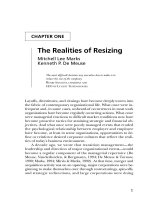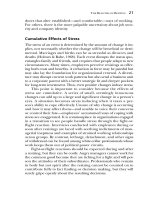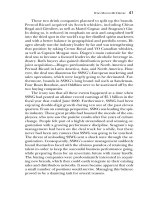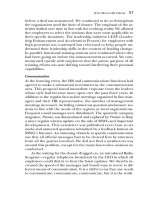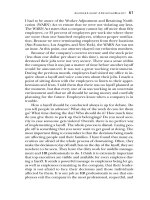Resizing The Organization 11 pps
Bạn đang xem bản rút gọn của tài liệu. Xem và tải ngay bản đầy đủ của tài liệu tại đây (91.27 KB, 10 trang )
parties results because the exchange is defined by economic terms,
a close-ended time frame has been established, and the scope of
the obligations is very narrow. In contrast, the relational compo-
nent emphasizes a socioemotive interaction between the parties.
Relational elements revolve around trust, respect, and commit-
ment developing over time. A relational exchange exists when both
parties expect that this relationship will continue on into the fu-
ture; in other words, it is open-ended, dynamic, and pervasive
(Rousseau, 1995). Table 5.1 summarizes the types of promises that
make up the relational and transactional components of the psy-
chological contract.
The conceptualization and measurement of the psychological
contract has been the subject of recent debate (Rousseau & Tijori-
wala, 1998). Most agree that it is multidimensional, yet its compo-
nents are discussed in a variety of ways. Some recent research has
gone beyond the transactional and relational distinction and iden-
tified as many as seven separate contract dimensions (Rousseau,
1998; Robinson, 1996). Turnley and Feldman (1998, 2000) have de-
veloped additional items that more fully address the extent to which
employees feel they have a good employment relationship. These
authors also use scales that capture a full range of potential re-
sponses to questions regarding psychological contract fulfillment.
RESIZING AND THE PSYCHOLOGICAL CONTRACT 81
Table 5.1. Examples of the Relational and Transactional
Components of the Psychological Contract.
Relational Transactional
(Intrinsic Outcomes) (Extrinsic Outcomes)
Opportunities for promotion and
advancement
Continuing professional training
Meaningful and challenging work
A job that provides autonomy and
control
Participation in decision making
Freedom to be creative
Career guidance and mentoring
Competitive salary
Pay for performance
Benefits (for example, health
care, retirement, vacation)
Stock options
Flexible work schedule
Safe work environment
TEAMFLY
Team-Fly
®
82 RESIZING THE ORGANIZATION
In other words, instead of just asking whether a contract obligation
was fulfilled, Turnley and Feldman assert that employees should
be asked the extent to which it was fulfilled and given the oppor-
tunity to report both underfulfillment and overfulfillment.
The Changing Nature of the Psychological Contract
The employee-employer relationship in the old economy was char-
acterized by long-term commitments where growth and compen-
sation came from expanding domestic markets (Kochan, 2001).
This psychological contract promoted lifetime employment and
loyalty between employee and employer. The new economy is heav-
ily influenced by global economies and demanding international
competition. This globalization has rendered regional labor ex-
pendable and interchangeable. While employees in the past could
rely on their employer to provide stable wages, we now have a dra-
matically new economy where job security, task assignment, and
organizational stability are uncertain (Kochan, 2001). The new psy-
chological contract emphasizes the need for a short-term orienta-
tion in the employment relationship (Rousseau, 1995).
Modern organizations are resizing themselves in a variety of
ways. Mergers, acquisitions, restructurings, outsourcings, and lay-
offs all play a prominent role in the current employment land-
scape. In fact, research has shown that mergers and acquisitions,
as well as layoffs, have reached record levels during recent years.
Global merger and acquisition activity reached a record $3.5 tril-
lion in the year 2000, an increase of almost 700 percent over the
$514 billion of reported merger activity in 1995 (“M&A in 2000,”
2001).
With regard to layoffs, in the first quarter of 2001 alone, there
were 1,664 mass layoff actions resulting in a loss of 305,227 jobs.
This is the highest number of layoff events and job loss in any quar-
ter since the government started collecting the data in 1995 (U.S.
Bureau of Labor Statistics, 2001). In addition, over 50 percent of
employers believe these reductions in force are permanent, and
thus the affected workers have little or no probability of being re-
called. The consulting firm Challenger, Gray and Christmas re-
ported that during April 2001, organizations announced 165,564
new job cuts, which is the fifth consecutive month with cuts ex-
ceeding 100,000 (“Announced Job Cuts,” 2001). During the early
1990s, many experts believed that mass layoffs were a temporary
event and eventually employment stability would return to normal.
However, each year has seen a constant flow of new layoff an-
nouncements. These 2001 figures follow record layoffs in 1999 and
2000, in which all sectors of the economy were represented (man-
ufacturing, retail, service, and now the dot-com companies).
The biggest impact that these resizing strategies have on the
changing psychological contract is that they undermine percep-
tions of long-term job security. Because job security does not ap-
pear to be a core tenet of the new employment relationship,
employees now are focusing more attention on other inducements,
such as autonomy, continuous training, and added responsibilities
( Jaffe & Scott, 1998). In general, today’s employees want to be em-
powered and expect to retain their marketability in case their cur-
rent employment relationship is severed.
Organizational Resizing and
Psychological Contract Breach
Morrison and Robinson (1997) define psychological contract
breach as the cognition that one’s organization has failed to fulfill
one or more obligations comprising the psychological contract.
This type of breach can cause the employee to have intense attitu-
dinal and behavioral reactions toward the employer (Rousseau &
McLean Parks, 1993; Robinson et al., 1994). When breaches or vi-
olations occur within an employee’s psychological contract, a vari-
ety of unfulfilled promises can deprive the employee of desired
outcomes and benefits (Robinson & Morrison, 1995; Robinson &
Rousseau, 1994).
From an equity theory perspective (Adams, 1965), individuals
try to find an equitable balance between what they receive from
the organization and their own contributions. When employees
perceive that their employer has failed to fulfill promised induce-
ments, they may withhold their own designated contributions by
reducing their performance or refusing to engage in expected or-
ganizational citizenship behaviors. In one study, Robinson and
Rousseau (1994) found that approximately 55 percent of employ-
ees believed their psychological contract had been violated by their
RESIZING AND THE PSYCHOLOGICAL CONTRACT 83
84 RESIZING THE ORGANIZATION
organization during the past two years. These researchers observed
that employee trust and satisfaction were inversely related to vio-
lations of the psychological contract. In addition, they found that
psychological contract violations were positively related to em-
ployee turnover. Finally, their results revealed that careerism mod-
erated the relationship between contract violations and trust,
satisfaction, and intentions to remain with the employer. Individ-
uals high on careerism “perceived their current employer as an in-
strumental stepping-stone up the interorganizational ladder” (p.
249). In other words, the more careerist the employee was, the
stronger the relationship was between perceived contract violations
and lack of trust in the organization.
Robinson (1996) also investigated the relationships between
specific types of contract breaches and employee reactions, atti-
tudes, and behaviors. Robinson examined seven types of employer
obligations and promises drawn from Rousseau’s measure of psy-
chological contracts (1990). In her research, Rousseau interviewed
human resource managers from thirteen engineering, accounting,
and manufacturing companies and identified the following seven
obligations that are most commonly promised by recruiters and or-
ganizations to applicants: (1) promotion and advancement, (2)
high pay, (3) pay based on current level of performance, (d) train-
ing, (5) long-term job security, (6) career development, and (7)
sufficient power and responsibility. Overall, Robinson (1996)
found moderate relationships between specific contract breaches
and trust, civic virtue, performance, and intentions to remain with
the organization. For instance, all of the seven obligations were
moderately related to an employee’s intention to remain with the
organization. Pay based on performance, training, career devel-
opment, and sufficient responsibility were associated with trust.
High pay, training, and career development were related to orga-
nizational citizenship behaviors (civic virtue). Promotion and re-
sponsibility were associated with actual turnover, and career
development was related to job performance.
In the same study, Robinson (1996) found that prior trust in
the organization at the time of hiring moderated the association
between psychological contract breach and trust eighteen months
after employees were hired. Individuals with low prior trust in the
organization exhibited lower feelings of trust after a contract
breach than did those individuals who had high initial trust in their
relationship with their employer. Robinson contended that these
findings were consistent with the research on attitude function and
cognitive consistency (Eagly & Chaiken, 1993). She argued that in-
dividuals with high initial trust are likely to assimilate aspects of an
unfulfilled psychological contract into their initial attitude of trust
in their employer and thus see a contractual infraction in a positive
way. Individuals who have a low level of initial trust are more likely
to interpret the unfulfilled promises in an unfavorable manner,
thereby confirming their initial attitude regarding the organization.
The measure of trust that Robinson used in this study in-
cluded items such as, “In general, I believe my employer’s motives
and intentions are good,” “My employer is open and upfront with
me,” and “I believe my employer has high integrity.” These items
address a type of trust that McAllister (1995) labels cognition-
based trust. Cognition-based trust is grounded in an individual’s
belief about peer reliability and dependability. It differs from af-
fective trust in that it is not contingent on an individual having a
strong emotional attachment with the other party. The establish-
ment of cognition-based trust between employees and organiza-
tional leaders will play an important role in the success of resizing
strategies, because it will facilitate communication efforts between
the two parties.
Employee Responses to
Psychological Contract Breach
The first aspect that is likely to have an impact on employees’ reac-
tions to psychological contract breach is the level of importance
they place on the outcomes that have been breached. The ex-
pectancy theory of motivation proposes that employees will be more
motivated to perform if they value the outcomes they receive when
they perform at a high level. This is the valence component of ex-
pectancy theory (Vroom, 1964). Building on this theory, it seems
reasonable to expect that an employee will be motivated to make
more extreme responses to contract breach when the outcomes
that have been violated are extremely important to that individual.
Lester and Kickul (2001) examined which psychological con-
tract obligations employees perceived as being most important and
how well employers were fulfilling these obligations. Their find-
ings revealed that employees rated obligations that were more
RESIZING AND THE PSYCHOLOGICAL CONTRACT 85
86 RESIZING THE ORGANIZATION
relational in nature (such as open and honest communication,
meaningful work, and trust and respect) as most important. Fur-
thermore, they found that many of these more important obliga-
tions were the same ones that organizations were finding more
difficult to fulfill. As expected, discrepancies between the impor-
tance placed on an obligation (by the employee) and the per-
ceived fulfillment of this obligation were significantly related to
employees’ attitudinal responses. Specifically, larger discrepancies
were associated with lower levels of job satisfaction and greater in-
tentions to leave the organization.
Employee Attributions for
Psychological Contract Breach
The types of attributions that employees make when they perceive
a psychological contract breach has occurred also may influence
their responses to breach. Previous theorists have proposed dif-
ferent categories of attributions that individuals may report in the
event of a breach.
Rousseau (1995) and Morrison and Robinson (1997) suggest
three main reasons that psychological contracts go unfulfilled. First,
reneging occurs when organizations intentionally and willfully fail to
keep their commitments to employees. For example, organizations
sometimes engage in layoffs even when they are making sizable
profits and members of the top management team are receiving
large bonuses. In such cases, individuals are likely to perceive that
the organization could have lived up to its prior commitments but
chose not to do so.
Second, disruption occurs when the organization is unable to
live up to its prior commitments due to changing economic or en-
vironmental factors. Often, this type of psychological contract
breach occurs when the organization is suffering financial hard-
ship or unexpected changes force it to alter existing practices. For
example, when an organization’s profit margins are shrinking, em-
ployees may expect that the organization will implement staff re-
ductions, merge departments, or close units.
Third, incongruence occurs when the employee recognizes that
there has been an honest misunderstanding regarding the terms
or conditions of the employment relationship. In such instances,
while employees do not receive what they expected, they recognize
the organization perceives that it is living up to its end of the bar-
gain. For example, employees may misunderstand the nature of
the organization’s profit-sharing plan. Thus, when the organiza-
tion fails to make its profit target and bonuses are lower than ex-
pected, employees may perceive that they have not received all the
compensation they expected. However, they may recognize that
the organization did not deliberately mislead them and may
attribute the breach to miscommunication or their own lack of dili-
gence in finding out exactly what was being offered (Lester, Turn-
ley, Bloodgood, & Bolino, 2002).
Since the psychological contract is based on an exchange re-
lationship, we believe that it is important to include a fourth cate-
gory of attributional response. We label this category of response
nullification. Remember that employees offer their contributions
to the organization in exchange for the inducements they expect
to receive. Thus, there may be cases when the psychological con-
tract has been nullified due to the employee’s failure to live up to
his or her end of the bargain. Although the self-serving bias makes
it unlikely that employees will make this particular attribution very
often, it is important to recognize this possibility.
When employees perceive that contract breach occurred be-
cause their organization intentionally reneged on its promises, we
hypothesize that they will respond more negatively. Conversely, if
employees indicate that the cause of psychological contract breach
was beyond the organization’s direct control, we predict them to be
more forgiving of the perceived violation. In an initial study to ex-
amine attributions for psychological contract breach, researchers
found that employees were more likely to attribute breach to reneg-
ing while their supervisors were more inclined to attribute breach
to factors outside the organization’s control (Lester et al., 2002).
Consequently, it is critical that organizations make necessary and
relevant information available to employees so that they understand
when psychological contract breach has resulted from environ-
mental conditions beyond the organization’s control.
Psychological Contract Breach and
Employee Perceptions of Justice
Other circumstances that may influence responses to breach in-
clude an employee’s perception of the underlying reasons and
RESIZING AND THE PSYCHOLOGICAL CONTRACT 87
88 RESIZING THE ORGANIZATION
considerations taken by the organization when a breach has oc-
curred. Two such factors are procedural justice and interactional
justice (Morrison & Robinson, 1997).
Procedural justice refers to the fairness of the decision-making
processes underlying the allocation of outcomes rather than the
outcomes themselves (Thibaut & Walker, 1975). Leventhal, Karuza,
and Fry (1980) suggested there are at least six procedural rules
that individuals use in judging fairness:
1. Procedures that are consistent across individuals and over time
(consistency)
2. Decisions that are grounded on good information and in-
formed opinion (accuracy)
3. Opportunities in place that can be used to modify or reverse
decisions based on inaccurate information (correctability)
4. Allocation processes that represent the concerns of all impor-
tant subgroups and individuals (representativeness)
5. Allocation processes that are compatible with prevailing moral
and ethical standards (ethicality)
6. No personal self-interest and blind allegiance that may narrow
preconceptions (bias suppression)
Any violation by a decision maker or an organization can lead to
perceptions of procedural injustice.
Interactional justice deals with how an individual is treated dur-
ing the enactment of procedures (Bies & Moag, 1986). This form
of justice includes whether individuals believe that the reasons un-
derlying a resource allocation decision were clearly and adequately
explained to them (Bies, Shapiro, & Cummings, 1988) and whether
those individuals responsible for implementing a decision treated
them with both respect and dignity (Bies & Moag, 1986; Shapiro,
Buttner, & Barry, 1995). An explanation of why interpersonal
treatment influences justice judgments can be found in group
value theory (Lind & Tyler, 1988). According to this theory, indi-
viduals value their relationships with work groups and organiza-
tions. When there is a perception of fair treatment, employees
may feel that they have a respected and dignified position within
the group or organization, thereby heightening their feelings of
self-worth. These feelings may be seen in their working relation-
ships with others where they take pride in being a group or orga-
nizational member (Lind & Tyler, 1988; Tyler, 1994; Tyler, Degoey,
& Smith, 1996).
Organizations are most likely to minimize negative connota-
tions associated with resizing efforts when employees perceive high
levels of procedural and interactional justice within their organi-
zations. When this occurs, individuals are more likely to accept the
explanations and justifications behind the resizing efforts as legit-
imate and thereby reason that the organization is reacting in a fair
and appropriate manner given the surrounding conditions and cir-
cumstances that may be beyond the organization’s control (such
as a poor economy). However, the absence of adequate justifica-
tions or explanations, combined with the loss of an outcome, may
imply that an employee is not worthy of respect and is seen as an
insignificant organizational member. The employee, in turn, may
have strong feelings of anger and blame the organization for being
causally responsible for the downsizing activity.
Folger (1993) noted that “exonerating behaviors (ethically re-
sponsive and socially desirable) that have no causal implications
for outcomes (e.g., advance notice, apologies, timely information,
courteousness, considerateness, honesty, and the like; cf., Folger
& Bies, 1989) can keep the decision maker from being a target of
resentment that increases as the perceived severity of the outcome
loss increases” (p. 177). Thus, employees will react more negatively
to unfair outcomes when an organization fails to use equitable pro-
cedures and conducts itself in an inappropriate manner, that is,
when procedural and interactional justice violations have occurred.
Individual Differences and Responses
to Psychological Contract Breach
An interesting avenue for additional research includes incorpo-
rating individual difference variables as moderators of the rela-
tionships between psychological contract breach and negative
employee attitudes and behaviors. One such individual difference
variable is equity sensitivity (Huseman, Hatfield, & Miles, 1985,
1987; King, Miles, & Day, 1993; Miles, Hatfield, & Huseman, 1989).
The equity sensitivity concept goes beyond equity theory by ex-
ploring individual differences in how one perceives what is and is
RESIZING AND THE PSYCHOLOGICAL CONTRACT 89
90 RESIZING THE ORGANIZATION
not fair. It also examines how these perceptions can have an in-
fluence on an individual’s reactions to injustices within the work-
place. Huseman and his colleagues (1985, 1987) contend that
there are three types of individuals who have varying degrees of
sensitivity to equity: benevolents, equity sensitives, and entitleds.
Miles, Hatfield, and Huseman (1989) have asserted that the con-
cern for the relationship between the employer and employee and
the desire for outcomes differentiates one type of individual from
another. At one end of the spectrum are the benevolents, who place
their emphasis on the relationship with their employer. At the op-
posite end of the spectrum are the entitleds, who believe that per-
sonal outcomes are of primary importance in dealing with their
organizations. In the middle of both benevolents and entitleds are
the equity sensitives, who place the same emphasis on having a
good employment relationship and achieving desired outcomes.
For the three forms of equity sensitivity, it may be interesting to ex-
plore how individuals differ in their reactions when their psycho-
logical contracts have been breached and both procedural and
interactional injustice are present.
Preliminary research suggests that the entitled individual re-
sponds more negatively to psychological contract breaches that affect
tangible, extrinsic outcomes such as pay and benefits (the transac-
tional component of the contract). Conversely, the benevolent indi-
vidual tends to react more negatively when promises of autonomy
and control, such as relational outcomes associated with a long-term
employment relationship, are broken (Kickul & Lester, 2001).
Implications for Managing
the Psychological Contract
When management introduces resizing initiatives, employees fre-
quently perceive these transitional periods as highly stressful times.
Organizational change often brings with it a sense of apprehen-
sion, concern, and uncertainty. This feeling of uncertainty is par-
ticularly stressful when employees perceive they have little control
over the outcomes that will result from proposed changes or the
process that leads to those changes. The rumors that emerge prior
to the actual implementation of changes often are far worse than
reality, because in the absence of information, employees’ percep-



